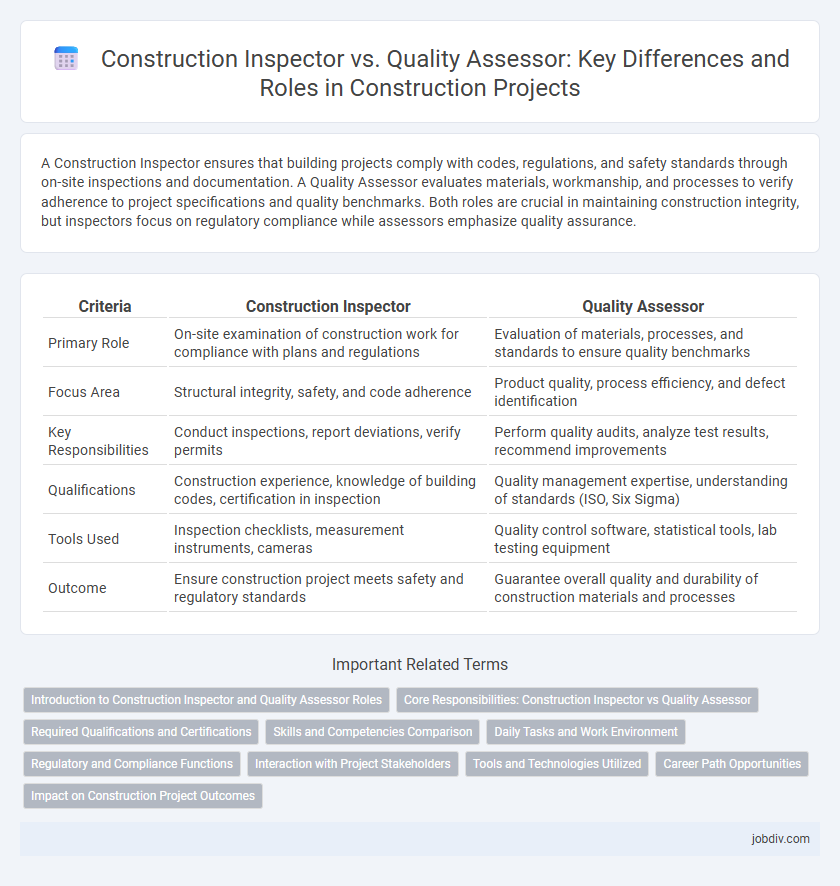A Construction Inspector ensures that building projects comply with codes, regulations, and safety standards through on-site inspections and documentation. A Quality Assessor evaluates materials, workmanship, and processes to verify adherence to project specifications and quality benchmarks. Both roles are crucial in maintaining construction integrity, but inspectors focus on regulatory compliance while assessors emphasize quality assurance.
Table of Comparison
| Criteria | Construction Inspector | Quality Assessor |
|---|---|---|
| Primary Role | On-site examination of construction work for compliance with plans and regulations | Evaluation of materials, processes, and standards to ensure quality benchmarks |
| Focus Area | Structural integrity, safety, and code adherence | Product quality, process efficiency, and defect identification |
| Key Responsibilities | Conduct inspections, report deviations, verify permits | Perform quality audits, analyze test results, recommend improvements |
| Qualifications | Construction experience, knowledge of building codes, certification in inspection | Quality management expertise, understanding of standards (ISO, Six Sigma) |
| Tools Used | Inspection checklists, measurement instruments, cameras | Quality control software, statistical tools, lab testing equipment |
| Outcome | Ensure construction project meets safety and regulatory standards | Guarantee overall quality and durability of construction materials and processes |
Introduction to Construction Inspector and Quality Assessor Roles
Construction inspectors ensure compliance with building codes, safety regulations, and project specifications by conducting site inspections and reviewing construction materials. Quality assessors focus on evaluating processes and final products to guarantee that construction standards and client requirements are met through systematic testing and documentation. Both roles collaborate to maintain construction integrity, safety, and adherence to industry standards.
Core Responsibilities: Construction Inspector vs Quality Assessor
Construction Inspectors primarily focus on ensuring that building projects comply with local codes, regulations, and safety standards through on-site inspections and detailed reports. Quality Assessors concentrate on evaluating materials, workmanship, and processes to guarantee that construction meets specified quality benchmarks and performance criteria. Both roles are essential for maintaining structural integrity but differ in scope, with inspectors emphasizing regulatory compliance and assessors prioritizing quality control.
Required Qualifications and Certifications
Construction Inspectors typically require certifications such as Certified Construction Inspector (CCI) or certifications from the International Code Council (ICC), along with a background in engineering or construction management. Quality Assessors often hold qualifications like Certified Quality Auditor (CQA) or Six Sigma certifications, emphasizing expertise in quality control processes and standards compliance. Both roles demand thorough knowledge of construction codes and regulations, but Inspectors focus more on compliance and safety, while Quality Assessors prioritize process improvement and defect prevention.
Skills and Competencies Comparison
Construction Inspectors possess strong skills in regulatory compliance, blueprint reading, and on-site safety monitoring, ensuring construction projects meet legal and structural standards. Quality Assessors excel in evaluating material quality, conducting detailed inspections, and implementing quality control processes to improve construction outcomes. Both roles require keen attention to detail and problem-solving abilities, but Inspectors emphasize adherence to codes while Assessors focus on product and process quality assurance.
Daily Tasks and Work Environment
A Construction Inspector conducts on-site evaluations to ensure structural compliance with building codes and safety regulations, often working outdoors in varying weather conditions. A Quality Assessor reviews materials, workmanship, and project documentation primarily in office or laboratory settings to verify adherence to quality standards. Both roles require attention to detail, but Inspectors focus on real-time site inspections while Quality Assessors emphasize documentation accuracy and material testing.
Regulatory and Compliance Functions
Construction inspectors ensure regulatory compliance by performing on-site evaluations to verify that construction activities meet local building codes, safety standards, and zoning laws. Quality assessors focus on evaluating materials and workmanship against predefined quality standards, ensuring that all project components adhere to contractual specifications and industry regulations. Both roles are critical in minimizing regulatory risks and maintaining the integrity of construction projects through systematic audits and compliance verification processes.
Interaction with Project Stakeholders
Construction Inspectors coordinate closely with project managers, contractors, and safety officers to ensure compliance with building codes and project specifications, facilitating timely issue resolution on-site. Quality Assessors engage with clients, designers, and suppliers to verify material standards and workmanship quality, thereby aligning project outcomes with contractual requirements. Their interaction with stakeholders is crucial for maintaining transparency, mitigating risks, and achieving project milestones in construction management.
Tools and Technologies Utilized
Construction Inspectors rely on tools such as digital measuring devices, drones for site surveillance, and software for compliance documentation to ensure structural and regulatory adherence. Quality Assessors utilize advanced non-destructive testing equipment, statistical analysis software, and Building Information Modeling (BIM) technology to monitor material quality and construction processes. Both professionals integrate technology to enhance accuracy, efficiency, and safety throughout the construction lifecycle.
Career Path Opportunities
Construction inspectors primarily focus on verifying that building projects comply with codes and regulations, often leading to roles in regulatory agencies or safety management. Quality assessors concentrate on evaluating materials and workmanship to meet standards, paving the way for careers in quality control management or process improvement within construction firms. Both roles offer advancement opportunities into project management or specialized consulting based on their expertise in compliance and quality assurance.
Impact on Construction Project Outcomes
Construction inspectors ensure compliance with building codes and safety regulations, directly preventing structural defects and legal liabilities that can delay projects. Quality assessors evaluate materials and workmanship quality to maintain standards, reducing rework and enhancing overall project durability. Together, their roles significantly improve construction project outcomes by ensuring safety, reliability, and adherence to client specifications.
Construction Inspector vs Quality Assessor Infographic

 jobdiv.com
jobdiv.com